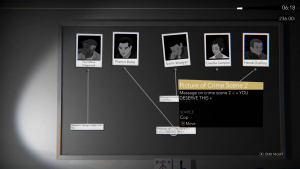A minimal but wonderfully immersive indie effort that casts you as a serial killer-chasing Parisian cabbie.
In this modern age of battle royale clones and giant open worlds, it can be easy to forget that video games can operate as a storytelling medium. Indie developers, at least, are keeping that core tradition alive, and Night Call proves to be a perfect example of how they are doing that.
Even by the standards of indie games – created by small teams with no access to armies of technical experts – Night Call is pretty minimal. It’s more or less monochrome and to play it, you pretty much only need one joystick and one controller button. Its rich, brilliant narrative is conveyed entirely by text, without any recourse to voice-acting. Yet from the most basic of ingredients, it fashions a gameplay experience that turns out to be wonderfully immersive, strangely soothing and very moreish.
Story-wise, Night Call is pretty simple, albeit agreeably off-beat. You play a taxi driver in Paris, of Arabic extraction, with a murky past, living in a shabby apartment under an assumed name. You come to the attention of the barely-competent Parisian police when you’re stabbed in your cab by a serial killer, at the scene of the fourth victim.
Somehow, despite your brush with death, the cops still suspect you, and the pushy policewoman in charge of the investigation gives you a week in which to work out who the real killer is. So you go back to work, and by driving fares around (including the suspects, occasionally) and using your conversational skills, plus visiting the scenes of the murders, reading newspapers and talking to petrol station attendants, you glean a mass of evidence – augmented by what your police-handler gives you.
 Fun though it is, the investigative element of Night Call doesn’t feel like the game’s be-all and end-all. Its real joy lies in the interactions you have with the wonderfully motley cross-section of customers you pick up. You work the night-shift, and the game is split into individual days; at the end of each one, you go home and can rearrange and peruse the evidence pinned to your corkboard.
Fun though it is, the investigative element of Night Call doesn’t feel like the game’s be-all and end-all. Its real joy lies in the interactions you have with the wonderfully motley cross-section of customers you pick up. You work the night-shift, and the game is split into individual days; at the end of each one, you go home and can rearrange and peruse the evidence pinned to your corkboard.
Night Call, very successfully, aims to give you a flavour of what modern Parisians are really like – their hopes, fears and obsessions are all revealed when you tease conversations out of them. The game contains some really interesting characters, who might draw you into surprisingly existentialist discourses, or provide light relief. Having the suspects in the back of your cab allows you to make judgment calls about whether or not they are guilty. And Night Call is not afraid to embark on flights of fantasy, for example letting you pick up an apparent time-traveller, or even the odd popular mythical character.
There’s a strangely relaxing, comforting flow to its gameplay, yet Night Call manages to be thought-provoking – issues such as Brexit and climate-denial are addressed in the game (although not in an overtly didactic way). While it’s quite short, its structure encourages multiple play-throughs: there are actually two different serial-killer scenarios along with the option to randomise the victims and suspects, and you can simply free-roam, picking up Parisian fares ad infinitum. If you want, you can morph it into an economic game, picking up only the fares likely to pay the most (you encounter regular passengers in the game, such as homeless people and prostitutes, who you have previously ferried around for free).
Night Call isn’t going to win any technical awards, nor does it have much of a shot at mainstream exposure. But it’s an object lesson in how indie developers can take the most meagre of elements and weave them into something compelling and fascinating – mainly via the power of good writing. If you prefer games that get you thinking, give Night Call a go.
